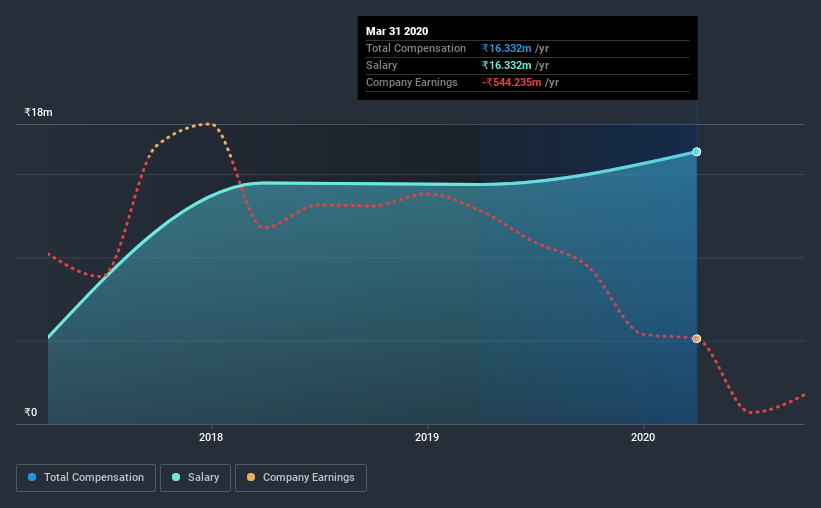Stock Analysis

Rajiv Nair has been the CEO of Kaya Limited (NSE:KAYA) since 2016, and this article will examine the executive's compensation with respect to the overall performance of the company. This analysis will also look to assess whether the CEO is appropriately paid, considering recent earnings growth and investor returns for Kaya.
Check out our latest analysis for Kaya
How Does Total Compensation For Rajiv Nair Compare With Other Companies In The Industry?
Our data indicates that Kaya Limited has a market capitalization of ₹2.9b, and total annual CEO compensation was reported as ₹16m for the year to March 2020. Notably, that's an increase of 14% over the year before. Notably, the salary of ₹16m is the entirety of the CEO compensation.
For comparison, other companies in the industry with market capitalizations below ₹15b, reported a median total CEO compensation of ₹2.9m. Accordingly, our analysis reveals that Kaya Limited pays Rajiv Nair north of the industry median.
| Component | 2020 | 2019 | Proportion (2020) |
| Salary | ₹16m | ₹14m | 100% |
| Other | - | - | - |
| Total Compensation | ₹16m | ₹14m | 100% |
Speaking on an industry level, all of total compensation represents salary, while non-salary remuneration is completely ignored. On a company level, Kaya prefers to reward its CEO through a salary, opting not to pay Rajiv Nair through non-salary benefits. If salary is the major component in total compensation, it suggests that the CEO receives a higher fixed proportion of the total compensation, regardless of performance.

A Look at Kaya Limited's Growth Numbers
Over the last three years, Kaya Limited has shrunk its earnings per share by 75% per year. It saw its revenue drop 28% over the last year.
Overall this is not a very positive result for shareholders. And the impression is worse when you consider revenue is down year-on-year. So given this relatively weak performance, shareholders would probably not want to see high compensation for the CEO. While we don't have analyst forecasts for the company, shareholders might want to examine this detailed historical graph of earnings, revenue and cash flow.
Has Kaya Limited Been A Good Investment?
With a three year total loss of 74% for the shareholders, Kaya Limited would certainly have some dissatisfied shareholders. Therefore, it might be upsetting for shareholders if the CEO were paid generously.
In Summary...
Kaya pays CEO compensation exclusively through a salary, with non-salary compensation completely ignored. As previously discussed, Rajiv is compensated more than what is normal for CEOs of companies of similar size, and which belong to the same industry. Disappointingly, share price gains over the last three years have failed to materialize. To make matters worse, EPS growth has also been negative during this period. Overall, with such poor performance, shareholder's would probably have questions if the company decided to give the CEO a raise.
CEO compensation is an important area to keep your eyes on, but we've also need to pay attention to other attributes of the company. We identified 2 warning signs for Kaya (1 shouldn't be ignored!) that you should be aware of before investing here.
Of course, you might find a fantastic investment by looking at a different set of stocks. So take a peek at this free list of interesting companies.
If you decide to trade Kaya, use the lowest-cost* platform that is rated #1 Overall by Barron’s, Interactive Brokers. Trade stocks, options, futures, forex, bonds and funds on 135 markets, all from a single integrated account. Promoted
Valuation is complex, but we're helping make it simple.
Find out whether Kaya is potentially over or undervalued by checking out our comprehensive analysis, which includes fair value estimates, risks and warnings, dividends, insider transactions and financial health.
View the Free AnalysisThis article by Simply Wall St is general in nature. It does not constitute a recommendation to buy or sell any stock, and does not take account of your objectives, or your financial situation. We aim to bring you long-term focused analysis driven by fundamental data. Note that our analysis may not factor in the latest price-sensitive company announcements or qualitative material. Simply Wall St has no position in any stocks mentioned.
*Interactive Brokers Rated Lowest Cost Broker by StockBrokers.com Annual Online Review 2020
Have feedback on this article? Concerned about the content? Get in touch with us directly. Alternatively, email editorial-team@simplywallst.com.
About NSEI:KAYA
Kaya
Owns and operates skin and hair care clinics in India and the Middle East.
Slightly overvalued with imperfect balance sheet.

